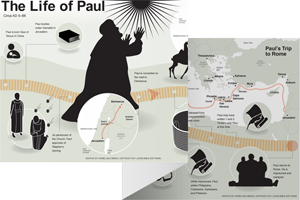24:1–21 As Paul makes his defense to the Roman governor Felix, he first argues for the legitimacy of the Church within the Roman Empire. |
24:1 Tertullus The Jewish leadership hires an attorney to persuade Felix that Paul had committed a crime against the empire.
24:2 peace Tertullus praises Felix for bringing peace to the nation, a rhetorical ploy to gain the sympathy and goodwill of the governor. This may be empty flattery.
24:5 riots Riots were illegal and viewed by the Roman Empire as equivalent to rebellion (19:40).
Nazarenes Tertullus associates followers of Jesus with His hometown. This was not what Christians called themselves (v. 14); it may have been a dismissive term meant to evoke the insignificance of Nazareth (compare John 1:46).
24:10–21 Paul defends himself against his accusers, showing the falsehood of the accusations against him and how his beliefs actually align with the ot Scriptures. |
24:10 for many years Unlike Tertullus, who uses flattery (Acts 24:1), Paul uses a simple introduction.
24:14 I do confess Paul has denied Tertullus’ accusation that he started riots, but he does admit to being a Jewish Christian.
24:15 a hope in God Paul centers the disagreement on theological matters, knowing that Roman officials generally stayed out of internal religious disputes.
resurrection of both the righteous and the unrighteous This belief, which was shared by the Pharisees but not by the Sadducees, was based on passages like Dan 12:1–4 (compare Matt 22:31–32; Rev 20).
24:17 charitable giving Paul collected money from Gentile (non-Jewish) churches to help those in Jerusalem who were suffering from a famine (e.g., Rom 15:26; 1 Cor 16:1–4).
24:18 purified Contrary to Tertullus’ accusation (Acts 24:6), Paul’s submission to purity rites supports his claim that he has caused no disturbances and did not defile the temple (see 21:24 and note).
24:19 Jews from Asia Those who brought the charges against Paul actually caused the near riot (21:27–28).
24:21 concerning the resurrection of the dead Paul quotes what he said earlier (23:6).
24:22–23 Paul believes his message offers hope for Jewish people (v. 15). Felix’s reaction confirms that the Gentiles (non-Jewish people) understand Paul’s presentation, and he allows Paul limited freedom (v. 23). |
24:22 Lysias Referring to Claudius Lysias, the Roman commander Paul had encountered earlier (23:26–27).
I will decide Felix never makes a decision, outside of to leave Paul in prison (v. 27). Lysias is not even recorded as being summoned.
24:24–27 Paul proclaims the gospel message to Felix and his wife. |
24:24 Drusilla Felix’s third wife, the daughter of Herod Agrippa I. She disobeyed Jewish law by divorcing her husband and marrying Felix.
24:26 money would be given to him Apparently bribes were so common in cases such as Paul’s that Felix expected it. The bribe Felix expected might have been to ensure Paul received a hearing, not necessarily to free him.
24:27 Felix received as successor According to first-century Jewish historian Josephus, Felix was removed from office two years after Paul’s hearing because he was unable to keep the peace between Jews and Gentiles in Caesarea (Josephus, Antiquities 20.182).
 Political Leaders in the New Testament Table
Political Leaders in the New Testament Table
Roman Procurators of Judaea | Approximate Date |
Pontius Pilate | ad 26–36 |
M. Antonius Felix | ad 52–60 |
Porcius Festus | ad 60–62 |
a favor Since the situation with the Jews is volatile, Felix leaves Paul in prison to appease them.

|
About Faithlife Study BibleFaithlife Study Bible (FSB) is your guide to the ancient world of the Old and New Testaments, with study notes and articles that draw from a wide range of academic research. FSB helps you learn how to think about interpretation methods and issues so that you can gain a deeper understanding of the text. |
| Copyright |
Copyright 2012 Logos Bible Software. |
| Support Info | fsb |
 Loading…
Loading…


